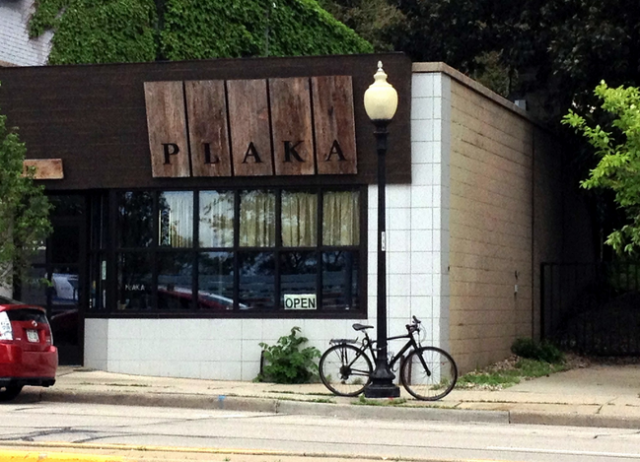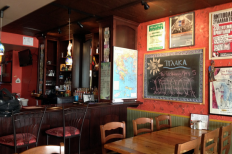







A canvas of brilliant blue water, white, sandy beaches, and lush, green vegetation, the Mediterranean region is a popular destination for travelers and one of the most widely represented cuisines among Madison’s international restaurants. Authentic Mediterranean food cannot be distilled to just one menu because the cultural and ethnic diversity surrounding the actual Mediterranean Sea makes for a diverse regional diet.
In Madison, restaurants whose chefs and owners have ties directly back to a Mediterranean home country include Plaka Taverna, Mediterranean Cafe, and Bunky’s Cafe. Though also Mediterranean, this article leaves Italian restaurants aside for future consideration in the Madison Flavors series.
Plaka Taverna
Plaka Taverna emerged on the Madison food scene in 2008 as, according to Telly Fatsis, owner of Plaka Taverna, the only authentic Greek restaurant in the city.
That authenticity and the recipes for many of the Greek dishes are a result of Fatsis’ Greek heritage. The moussaka and spanakopita are his mother’s recipes. Also, pork souvlaki is a recipe from his uncle’s grill in Messenia, Greece. Although Fatsis grew up in Madison, he learned a lot about authentic Greek food from vacationing in Greece and watching his uncle cook.
A lot of people in the village grew fresh herbs on their patios like basil, mint, parsley, oregano, thyme and dill, according to Fatsis. He tries to mix and balance different herbs and spices to create unique flavors in all of Plaka’s dishes. “A good spanakopita will have dill in it,” he said.
 The interior of Plaka Taverna.Plaka also offers mezethes, or small plates similar to Spanish tapas. They are a Greek tradition because the people do not believe in drinking on an empty stomach.
The interior of Plaka Taverna.Plaka also offers mezethes, or small plates similar to Spanish tapas. They are a Greek tradition because the people do not believe in drinking on an empty stomach.
"In a lot of the Mediterranean countries eating is a social thing," Fatsis said. "You just don’t drink without eating."
In Greece, a diet of fresh vegetables and beans developed over time mostly because of the economic conditions of the people, according to Fatsis.
“For the most part these people were relatively poor,” Fatsis said. "In Greece they had civil wars where people just ate greens and bread and thats what they had to live on for months and months and months.”
He also pointed out that red meat was not as plentiful as in America due to the limited grazing area in Greece.
Mediterranean Cafe
Faycal Belakhdar, owner and chef of Mediterranean Cafe on State Street, embraces the regionality of Mediterranean cuisine. Although he is a native Algerian, Belakhdar’s main dishes incorporate many Middle Eastern culinary influences.
“I don’t believe in food from one country,” said Belakhdar, who has been cooking on State Street for 17 years.
He views the Mediterranean diet in terms of three subregions: the Middle East, Northern Mediterranean Sea
Although each nation in the Mediterranean region has developed unique aspects that define the national food culture, many authentic Mediterranean dishes are actually a fusion of flavors from different nations, according to Balakhdar. For example, Mediterranean Cafe serves a sweet, hot tea that encompasses the flavors of Earl Grey from the Middle East and mint from North Africa.
Even though Belakhdar admits that there is a certain fusion of Mediterranean flavors that occurs, he says the major Mediterranean spices and herbs are olive oil, lemon, oregano, garlic, cumin, parsley and turmeric.
The Mediterranean diet is heavily influenced by the climate and environment. Spanning three continents and 21 nations, the Mediterranean experiences hot and dry summers with mild, wet winters. This particular climate allows certain agricultural products to flourish, specifically citrus fruits, grapes and olives. Due to the proximity of the sea, fish has become a significant part of the Mediterranean diet.
Bunky’s Cafe, and other Madison Mediterranean restaurants
Bunky’s Cafe Owner and Chef Rachid Ouabel is a native of Morocco and the source of many of the cafe’s Moroccan recipes like Kafta Brochette, ground lamb mixed with special spices. Traditional ingredients include okra, a vegetable used mainly in Moroccan stews and soups, and couscous, a grain believed to have originated in Morocco.
Bunky’s embraces a fusion of Italian and Mediterranean cuisines. Bunky’s Cafe General Manager Tina Calantoni said that Bunky’s brings out the authentic flavors of the Mediterranean by using the freshest ingredients and cooking from scratch. Thus, while Bunky’s is proud of its Mediterranean authenticity, the cafe also buys fresh, local ingredients as much as possible Calantoni said.
Although each Mediterranean restaurant in Madison is influenced by a particular nation or focuses on the food culture from a specific region, there are certain dishes and Mediterranean traditions common to almost all of the restaurants. Some common dishes include hummus, tabouli, falafel, baba ghanouj, pita bread, stuffed grape leaves, couscous and shawarma. Common Mediterranean ingredients include tahini (ground sesame seed paste), yogurt, chickpeas, parsley, lemon, garlic, feta cheese, olives, tomato, and cucumber.
Madisonians may taste the authentic flavors of the Mediterranean at a few other restaurants in the city. Husnu’s on State Street specializes in Turkish cuisine. Established in 1979, the restaurant is one of the oldest Middle Eastern restaurants in Madison. Nile Restaurant on Odana Road features authentic Middle Eastern dishes as well. Kabul on State Street specializes in Afghan and Mediterranean cuisine, and Oliva, on High Point Road, serves Turkish bread with its Mediterranean-Italian cuisine.
Although it is clear that certain spices and dishes are truly authentic Mediterranean, many Madison chefs embrace a fusion of flavors from the different nations that comprise the Mediterranean region. Realistically, that is what the Mediterranean is, a fusion of ethnicities and cultures.
|
|
|
Welcome to the Madison Commons, a website designed to provide news and information about all of Madison's neighborhoods and a crossroads for the discussion of community issues. The name comes from the idea of a village commons, a place for news, talk, debate, and some entertainment, too, that's open to everyone.
All rights reserved. Read more about the Madison Commons and its partners.

